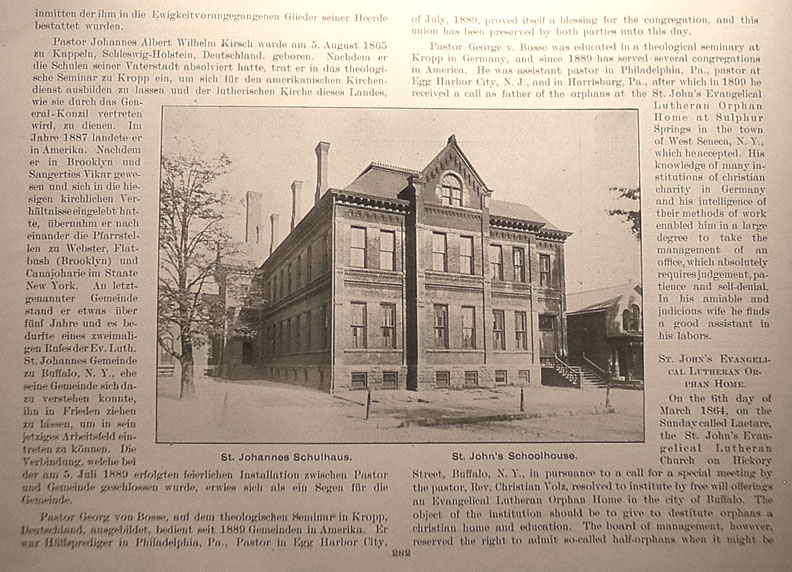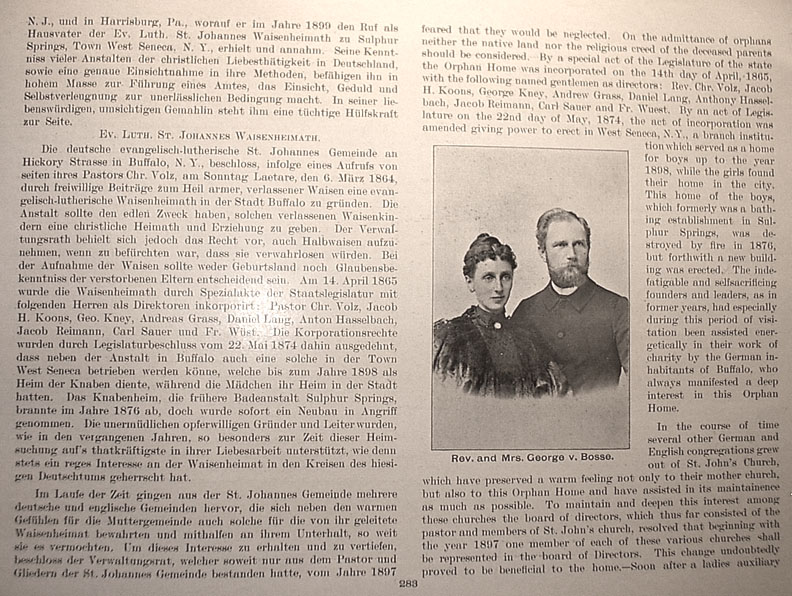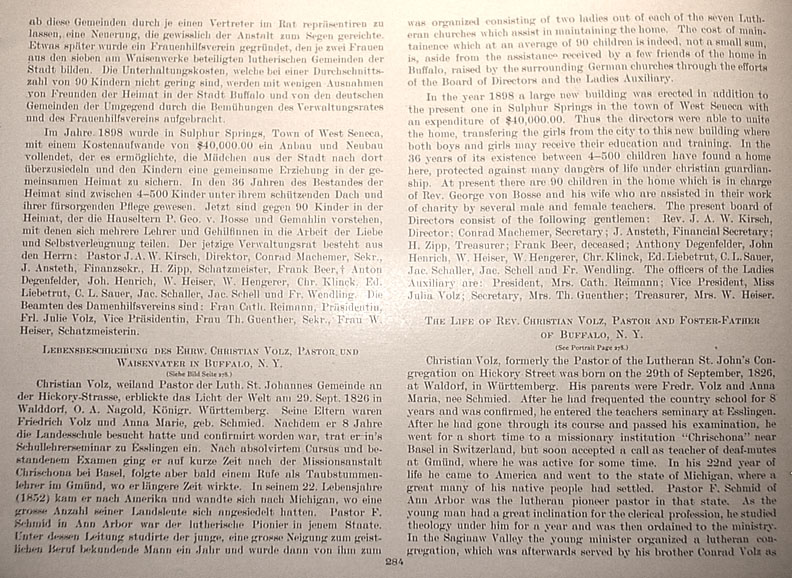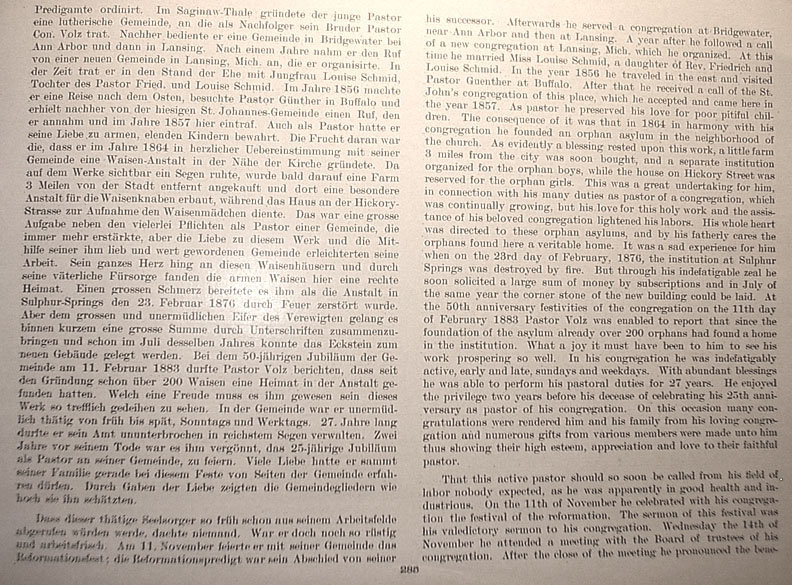
| . | of July, 1889, prove itself a blessing for the congregation, and this union has been preserved by both parties unto this day. Pastor George v. Bosse was educated in a theological seminary at Kropp in Germany, and since 1889 has served several congregations in America. He was assistant pastor in Philadelphia, Pa., pastor at Egg Harbor City, N.J., and in Harrisburg, Pa., after which in 1899 he received a call as father of the orphans at the St. John's Evangelical Orphan Home at Sulphur Springs in the town of West Seneca, N.Y., which he accepted. His knowledge of many situations of christian charity in Germany and his intelligence of their methods of work enabled him in a large degree to take the management of an office, which requires judgement [sic], patience and self-denial. In his amiable and judicious wife he finds a good assistant in his labors. St. John's Evangelical Lutheran Orphan Home On the 6th day of March 1864, on the Sunday called Laetare, the St. John's Evangelical Lutheran Church on Hickory Street, Buffalo, N.Y., in pursuance to a call for a special meeting by the pastor, Rev.Christian Volz, resolved to institute by free will offerings an Evangelical Lutheran Orphan Home in the city of Buffalo. The object of the institution should be to give to destitute orphans a christian home and education. The board of management, however, reserved the right to admit so-called half-orphans when it might be Caption under picture at center reads St. Johns' Schoolhouse
|

| . | feared that they would be neglected. On the admittance of orphans neither the native land nor the religious creed of the deceased parents should be considered. By a special act of the Legislature of the state the Orphan Home was incorporated on the 14th day of April, 1865, with the following named gentlemen as directors: Rev. Chr. Volz, Jacob H. Koons, George Kney, Andrew Grass [1], Daniel Lang, Anthony Hasselbach [2], Jacob Reimann, Carl Sauer and Fr. Wuest. By an act of Legislature on the 22nd day of May, 1874, the act of incorporation was amended giving power to erect in West Seneca, N.Y., a branch institution which served as a home for boys up to the year 1898, while girls found their home in the city. This home of the boys, which formerly was a bathing establishment in Sulphur Springs, was destroyed by fire in 1876, but forthwith a new building was erected. The indefatigable and self sacrificing founders and leaders, as in former years, had especially during this period of visitation been assisted energetically in their work of charity by the German inhabitants of Buffalo, who always manifested a deep interest in this Orphan Home. In the course of time several other German and English congregations grew out of St. John's Church, which have preserved a warm feeling not only to their mother church, but also to this Orphan Home and have assisted in its maintainemnce as much as possible. To maintain and deepen this interest among these churches the board of directors, which thus far consisted of pastor and members of St. John's Church, resolved that beginning with the year 1897 one member of each of these various churches shall be represented in the board of Directors. This change undoubtedly proved to be beneficial to the home. - Soon after a ladies auxiliary Caption under picture at center right reads Rev. and Mrs. George v. Bosse [1] The German text gives the name as "Andreas Grass". Return to text [2] The German text gives the name as "Anton Hasselbach". Return to text |

| . | was organized consisting of two ladies out of each of the seven Lutheran churches which assist in maintaining the home. The cost of maintainence which at an average of 90 children is indeed, not a small sum is, aside from the assistance received by a few friends of the home in Buffalo, raised by the surrounding German churches through the efforts of the Board of Directors and the Ladies Auxiliary. In the year 1898 a large new building was erected in addition to the present one in Sulphur Springs in the town of West Seneca with an expenditure of $40,000.00. Thus the directors were able to unite the home, transfering the girls from the city to this new building where both boys and girls may receive their education and training. In the 36 years of its existence between 4 - 500 children have found a home here, protected against many dangers of life under christian guardianship. At present there are 90 children in the home which is in charge of Rev. George von Bosse and his wife who are assisted in their work of charity by several male and female teachers. The present board of Directors consist of the following gentlemen: Rev. J.A.W. Krisch, Director; Conrad Machemer, Secretary; J. Ansteth, Financial Secretary; H. Zipp, Treasurer; Frank Beer, deceased; Anthony Degenfelder, John Henrich, W. Heiser, W. Hengerer, Chr. Klinck, Ed. Liebetrut, C.L. Sauer, Jac. Schaller, Jac. Schell and Fr. Wendling. The officers of the Ladies Auxiliary are: President, Mrs. Cath. Reimann; Vice-President, Miss Julia Volz; Secretary, Mrs. Th. Guenther; Treasurer, Mrs. W. Heiser. The Life of Rev. Christian Volz, Pastor and Foster-Father of Buffalo, N.Y.
Christian Volz, formerly the pastor of the Lutheran St. John's Congregation on Hickory Street was born on the 29th of September, 1826, at Waldorf, in Württemberg. [1] His parents were Fredr. Volz and Anna Maria, nee Schmied. After he had frequented the country school for 8 years and was confirmed, he entered the teachers seminary at Esslingen. After he had gone through its course and passed his examination, he went for a short time to a missionary institution "Chrischona" near Basel in Switzerland, but soon accepted a call as teacher of deaf-mutes at Gmünd, where he was active for some time. In his 22nd year of life he came to America and went to the state of Michigan, where a great many of his native people had settled [2]. Pastor F. Schmid of Ann Arbor was the lutheran pioneer pastor in that state. As the young man had a great inclination for the clerical profession, he studied theology under him for a year and was then ordained to the ministry. In the Saginaw Valley the young minister organized a lutheran congregation, which was afterwards served by his brother Conrad Volz as [1] The German text states that Pastor Volz was born "in Walddorf, in the upper district of Nagold, in the Kingdom of Württenberg." Return to text [2] The German text states "In his 22nd year of life (1852) he came to America..." Doing the math would put the year at 1848. Return to text
|

| . | his successor. Afterwards he served a congregation at Bridgewater, near Ann Arbor and then at Lansing. A year after he followed a call of a new congregation at Lansing, Mich., which he organized. At this time he married Miss Louise Schmid, a daughter of Rev. Friedich and Louise Schmid. In the year 1856 he traveled in the east and visited Pastor Guenther at Buffalo. After that he received a call of the St. John's congregation of this place, which he accepted and came here in the year 1857. As pastor he preserved his love for poor pitiful children. The consequence of it was that in 1864 in harmony with his congregation he founded an orphan asylum in the neighborhood of the church. As evidently a blessing rested upon this work, a little farm 3 miles from the city was soon bought, and a separate institution orgnaized for the orphan boys, while the house on Hickory Street was reserved for the orphan girls. This was a great undertaking for him, in connection with his many duties as pastor of the congregation, which was continually growing, but his love for his holy work and the assistance of his beloved congregation lightened his labors. His whole heart was directed to these orphan asylums, and by his fatherly cares the orphans found here a veritable home. It was a sad experience for him when on the 23rd day of February, 1876, the institution at Sulphur Springs was destroyed by fire. But through his indefatigable zeal he soon solicited a large sum of money by subscription and in July of the same year the corner stone of the new building could be laid. At the 50th anniversary festivities of the congregation on the 11th day of February 1883 Pastor Volz was enabled to report that since the foundation of the asylum already 200 orphans had found a home in the institution. What a joy it must have been to him to see his work prospering so well. In his congregation he was indefatigably active, early and late, sundays and weekdays. With abundant blessings he was able to perform his pastoral duties for 27 years. He enjoyed the privilege two years before his decease of celebrating his 25th anniversary as pastor of his congregation. On this occasion many congratulations were rendered him and his family from his loving congregation and numerous gifts from various members were made unto him thus showing their high esteem, appreciation and love to their faithful pastor. That this active pastor should so soon be called from his field of labor nobody expected, as he was apparently in good health and industrious. On the 11th of November he celebrated with his congregation the festival of the reformation. The sermon of this festival was his valedictory sermon to his congregation. Wednesday the 14th of November he attended a meeting with the Board of trustees of his congregation. After the closing of the meeting he pronounced the
|

| . |
benediction, and after he had said the word "amen," he fell, being struck with paralysis. "I am dying" was his last word. He was carried dead from the orphan asylum to the nearby parsonage. The horror with which his family, the congregation and his colleagues were seized at the intelligence of his sudden death can be better felt than described. In his 57th year of age the Lord called him suddenly from his labors. He was survived by a sorrowful widow and 3 daughters mourning his demise. The congregation, which he served so faithfully unto his end, still preserves a warm memory for him. Evangelical Lutheran Tabor Congregation
After mission services had been conducted since March 1890 by pastor A.T. Hanser, mostly in private houses in the northern part of the city, a congregation was organized on the 14th day of October, 1891. The confession of the congregation is that of the Missouri Synod of which it is a member. The number of voting members at that time was fourteen. Its wardens were John Wagner, G. Lippki and E. Fritz, the first mentioned acting at the same time as the treasurer. The building lot on Le Roy Avenue was bought in 1892 by the mission committee, and the church edifice (35 x 45 feet) was dedicated in March 1893. The cost of the church property was $3,846.00. In June 1894 the congregation called its own minster in the person of Pastor N. Soergel. The congregation maintains a weekday school, in which the minister teaches in the German and English languages. The school is attended by 24 children. The school building, which was erected in 1897, is located in the rear of the church. The congregation now has 24 voting members. It is supported by the mission treasury of the Synod. The present officers are: Pastor N. Soergel, president; C. Luckow, secretary; J. Gagern, treasurer. The German Evangelical Lutheran Christ congregation In the year 1873, upon the suggestion of Pastor Christian Volz, now deceased, a chapel was built and dedicated on Bork (now Detroit) Street [1], for Sunday school purposes by the Young Men's Society of the St. John's congregation. Up to June 1888 Sunday school was held, when Pastor Theo. H. Becker was called by the trustees of the chapel for the purpose of organizing a congregation. After a year a self-sustaining congregation could be organized under the name of Evangelical Lutheran Christ Church, which adopted the constitution of the General Council. The first year the mission was amply assisted by the Young Men's Society of the mother congregation. [1]The German text adds that Bork Street was near Broadway. Return to text
Return to Indexes Go on to Pages 287 - 291
Revised May 8, 2005
|
